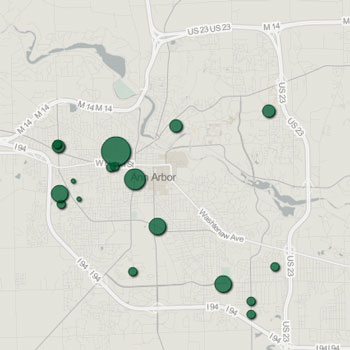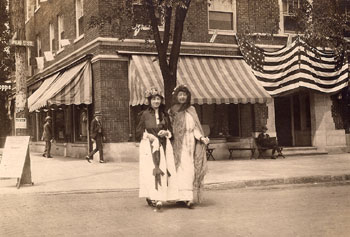After a Feb. 11, 2013 budget work session that included separate presentations on the city’s capital improvements plan (CIP) and the Ann Arbor Housing Commission (AAHC), both of these topics came up again briefly at the city council’s most recent regular meeting.
During communications time for the council’s meeting on Feb. 19, 2013, Stephen Kunselman (Ward 3) expressed his view that the CIP should start including the 360 units of public housing managed by the AAHC.

Ann Arbor Housing Commission properties. The size of the dot is proportional to the number of units in the location. (Map by The Chronicle. Image links to interactive map.)
Kunselman’s argument for future inclusion of AAHC properties in the city’s CIP is based in part on the fact that the city of Ann Arbor currently holds the deeds to those properties. But his broader point is that he’s opposed to the city relinquishing title to the properties – as part of a proposal made to the council by AAHC executive director Jennifer L. Hall. Hall has served in that capacity for about a year, and began her Feb. 11 presentation at the council work session with an overview of improvements that AAHC has achieved since she took the post.
Hall’s proposal stems from a need to cover an estimated $500,000 per year funding gap for needed capital investments, coupled with a perceived shift in priorities by the U.S. Dept. of Housing and Urban Development (HUD) in its funding strategy. That shift is somewhat away from subsidized public housing, where rent is subsidized in units owned by a housing commission. [Ann Arbor's situation is apparently unique – because the city, not the AAHC, holds the deeds.] While HUD still allocates several billion dollars nationally for public housing, it subsidizes even more in programs that are based on vouchers. And based on the last three years, the trend is toward more funding on the federal level for vouchers than for public housing.
Some HUD vouchers are tied to a tenant – a person. A potential tenant can take that voucher to a private landlord – and it’s the tenant who receives the rent subsidy, wherever that tenant is able to rent a place to live. Other HUD vouchers are tied instead to privately-owned property, and whoever lives in that private project receives the rent subsidy.
The strategy that Hall will be asking the council to authorize is one that converts AAHC properties to part private ownership, in order to take advantage of project-based HUD vouchers. The private ownership of the AAHC properties will also allow the possible use of tax credit financing to pay for needed capital investments – roofs, boilers, plumbing and the like.
The conversion to project-based vouchers would take place under HUD’s Rental Assistance Demonstration (RAD) program. To set the stage for that, the board of the AAHC selected a co-developer at its Jan. 10, 2013 meeting: Norstar Development USA.
The council would need to take two specific steps in order to proceed with the RAD: (1) approve the contingent transfer of the city-owned AAHC properties to the AAHC; and (2) approve a payment in lieu of taxes (PILOT) for the properties so that they’d owe just $1/unit in property tax per year. As city-owned properties, no property tax is currently owed. Without the PILOT provision, taxes would be owed. Requests to take those steps are expected to come to the council in March. March will also be a period during which public hearings will take place on this issue.
Although Kunselman expressed clear opposition to the idea of transferring the deeds, and Mike Anglin (Ward 5) joined him in expressing significant skepticism, other councilmembers were more positive. They still had several questions about the complexities and the risks associated with the RAD program. [For more background on the AAHC’s efforts to prepare for the RAD program, see Chronicle coverage: “Housing Commission Eyes Major Transition.”]
The Feb. 11 budget work session included the 15th District Court and the capital improvements plan (CIP). A session held on Feb. 25 covered the fund-by-fund budget picture for the next two years. Presentations on those topics are covered in separate Chronicle reports. The council’s discussion of its budget priorities – identified at a planning retreat late last year – is expected to begin at a March 11 work session. [Full Story]






